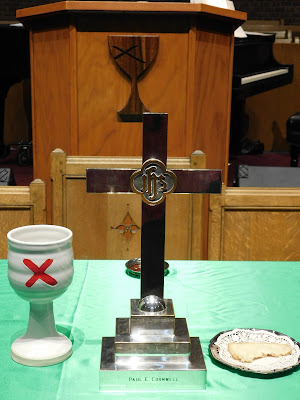Communing Virtually in a Time of Crisis
Back
during my seminary days, my friend Steve called up to tell me that Gene Scott,
a rather eccentric TV preacher, was inviting people to commune via television.
This was in the days before we had personal computers or cell phones. Television
and radio were still the only forms in which virtual communication took place, unless,
of course, you were very wealthy and had a car phone. So, I rushed over to his
apartment to view this abomination. Who would have thought that years later, my
congregation would be inviting people to participate in communion online, from
their homes? Yet, in this moment of crisis, we’re joining many others to do just
that. We’re inviting people to commune from their homes.
Different
denominations have different rules and beliefs about the Table. I've written a small book that explores ways in which we encounter Jesus at the Table (The Eucharist: Encounters with Jesus at the Table), and the fact is our understandings of the Table have evolved and continues to evolve. My denomination
(Disciples of Christ) practices weekly communion but doesn’t require clergy to
consecrate or administer communion. Clergy might be at the Table, but they
generally share the duties with Elders. While this is the general practice, in
theory, any baptized Christian can celebrate the Eucharist. So, we don’t worry
as much about whether elements partaken away from the church are properly consecrated.
We assume that Jesus is present in homes as well as at the church. Therefore,
we have a certain amount of flexibility when it comes to the Table.
I still
believe that all things being equal it’s best to gather together as a community
to celebrate the Eucharist. There is something different about such gatherings
than we can experience separately. Gathering together in person at the Table
helps us envision the message of unity that is found in Christ. But, right now,
we can’t gather in person. While we could forgo communion—some communities have
called for a fast from communing during this time—I don’t think this is a necessary
step.
There
has been a lot of conversation about this issue in the life of the church, and
I’m sure that after this is all over there will be books and articles written
to explore this situation. One attempt to examine this question of whether to
offer communion virtually was provided by my friend Dr. Deanna Thompson, who
serves as the Director of the Lutheran Center for Faith, Values, and Community
at St. Olaf College. Deanna wrote a wonderful book titled The Virtual Body of Christ that explores how the church has always existed and will continue to
exist virtually. Her engagement with this concept is rooted in her discovery of
the value of social media as a means of communication as she battled serious
cancer.
It’s
out of this experience with the virtual body of Christ that Deanna wrote a blog
post for the organization she now directs. It’s titled Christ is Really Present Virtually: A Proposal for Virtual Communion. What I appreciate
about this essay is that it’s written by a theologian who is a member of a community
that requires clergy participation in the act of consecration. She writes of
this new reality:
As we consider what it might mean to do communion virtually, it is important to reflect more deeply on what being present to one another in virtual spaces actually means. While conventional wisdom tends to view virtual spaces as disembodied and therefore inferior to embodied, in-person presence, theologian Kathryn Reklis insists that our theology must move beyond “seeing the real versus virtual divide in terms of embodied versus disembodied,” and we must think more creatively about “the new permutations of digital and virtual technology informing our lives as particular ways we are embodied.”
While her denomination is encouraging fasting from communion
and putting an emphasis on the Word, she recognizes that many are offering
communion online.
The question is what does this mean and how might we do this?
She gives some suggestions in her essay as to how this can take place. She also
draws on the theology of Martin Luther (she’s a Luther scholar). Thus, she
writes:
In his theology of the cross, Martin Luther insisted that God is present precisely where we least expect God to be. Luther called on Christians to pay attention to God’s hidden presence in the pain and suffering of the cross, witnessing how God is at work in such unexpected places to bring redemption and healing. Rather than discouraging practicing communion virtually, perhaps we’re being called to more reflection on how God is really present even where many least expect God to be: in, with and through virtual spaces.
I think
that at some point, when we have an opportunity to look back and reflect on
this moment, we will have learned something important about God, about the
church, and about ourselves. We’re still in the middle of the crisis, which
means we're still adapting, not knowing when things will “return to normal.”
But I think that Deanna is on to something here. That is to reflect on how God
is present in ways we might not normally expect, including in the virtual
spaces. With that in mind, I do recommend reading her essay in full:
As I bring this to a close, I will admit that I am
looking forward to the time when the congregation can regather in the church building to share in the
singing of hymns and gather at the Table—in-person—but we’re not there right
now. While we can't be present at the Table together, I do truly believe that Jesus is still present with us in our communing, wherever we find ourselves. Until that time comes, we can, I believe, hold on to the promise that
Jesus never leaves us nor forsakes us (Heb. 13:5).

Comments